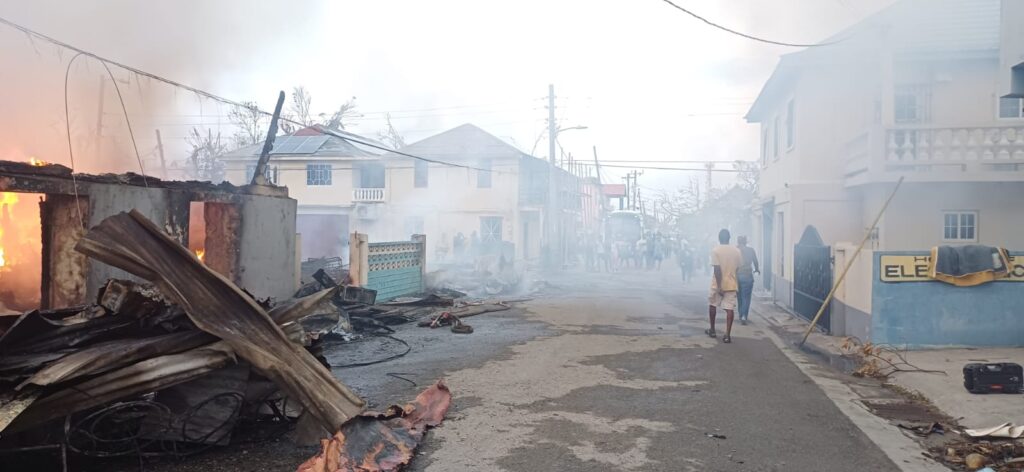In the wake of Hurricane Melissa’s catastrophic impact on western Jamaica, the Chinese business community has spearheaded a massive relief effort, mobilizing over $100 million in emergency supplies. The Category 5 storm, which struck on October 28, left widespread devastation, particularly in the southern regions of St Elizabeth, Westmoreland, and St James. Leading the charge, LCH Developments, in collaboration with its construction partner Brothers Concepts & Solutions Limited, swiftly deployed heavy machinery to clear blocked roads, ensuring critical access for aid distribution.
博客
-

Bahamas short of 500 nurses
The Bahamas is confronting a critical shortage of approximately 500 registered nurses, according to Dr. Aubynette Rolle, Managing Director of the Public Hospitals Authority (PHA). This alarming deficit, exacerbated by the mass departure of healthcare professionals and plummeting staff morale, is placing immense strain on the nation’s public health system. Dr. Rolle revealed that instances of over ten nurses resigning in a single month have had a ‘significant impact’ on operations.
To address the crisis, the PHA has intensified efforts to recruit nurses from Africa and other countries while striving to retain Bahamian staff. However, Dr. Rolle emphasized that the issue extends beyond financial compensation. Factors such as job satisfaction, professional development opportunities, and leadership support play a pivotal role in retaining nurses. “It’s not only the dollar figure,” she stated. “It’s about feeling valued, having a clear career path, and receiving mentorship from leaders.”
The situation has drawn sharp criticism from Bahamas Nurses Union President Muriel Lightbourn, who reported that more than 50 nurses have left the public healthcare system in the past three to four months. The union is advocating for enhanced benefits and improved working conditions to curb the exodus of skilled professionals.
Recent incidents, such as the suspension of senior nurse Pearl Williams after she highlighted deplorable conditions at Princess Margaret Hospital—including leaking roofs, rodent infestations, and supply shortages—have further underscored the system’s challenges.
Dr. Rolle noted that the most severe shortages are in specialized fields like intensive care, neonatal care, midwifery, and dialysis. The PHA is developing new training modules to ensure continuous professional development through its academy. Despite these efforts, the nursing shortfall appears to be worsening, with Dr. Rolle’s latest assessment contradicting earlier claims by Health and Wellness Minister Dr. Michael Darville, who had suggested the gap was narrowing.
The COVID-19 pandemic has further eroded morale, with many nurses grieving the loss of relatives and colleagues without adequate time to process their emotions due to chronic understaffing. Dr. Rolle acknowledged the need for improved working conditions, access to training, and better staff treatment. She highlighted initiatives such as psychological support spaces, leadership training, and the establishment of a Patient Experience Department to enhance communication and care delivery.
While Dr. Rolle assured that the PHA is actively addressing complaints about staff behavior and patient care, she cautioned that meaningful improvements will require time and sustained effort.
-

Portland farmers grateful despite losses from devastating hurricane
In the wake of Hurricane Melissa, farmers in Portland, Jamaica, are counting their blessings despite significant agricultural losses. While the storm wreaked havoc on their crops, many are relieved that the damage was not more severe. Among those affected are Dennis and Oral Brown, a father-and-son farming duo from Orange Bay, who have been working tirelessly to salvage what remains of their harvest. Their farm, which primarily grows coconuts, plantains, jackfruit, and avocados, suffered extensive damage, with many trees uprooted and produce spoiled. The Browns managed to gather approximately 500 coconuts, falling short of their 1,000-coconut target, and are now pricing them at $10,000 per 100 units. Plantains are being sold at $800 per dozen. Despite the financial setback, Dennis expressed gratitude for their safety, stating, ‘We still giving thanks for life.’ Meanwhile, Prince Dias, a veteran fruit vendor operating on the border of Portland and St Mary, shared similar challenges. His banana and plantain crops were completely destroyed, leaving him without produce to sell. Dias, who has been in the business for 15 years, estimates it will take up to a year to recover fully. Both the Browns and Dias are focusing on alternative sources of income, such as raising livestock, and remain hopeful for the future. While the road to recovery will be arduous, the resilience and gratitude of these farmers shine through in the face of adversity.
-

Modern medicine brings new hope but: Diabetes on the rise in Trinidad and Tobago
The International Diabetes Federation (IDF) has revealed alarming statistics indicating that over 40% of adults in Trinidad and Tobago (TT) are overweight or obese, a significant risk factor for Type 2 diabetes. Currently, diabetes affects 12-15% of the population, with at least 150,000 individuals diagnosed. However, Dr. Chad Bisambar, a renowned diabetes specialist and endocrinologist, warns that the actual number is likely higher due to undiagnosed cases. Diabetes, a chronic condition characterized by elevated blood glucose levels, arises from insufficient insulin production or ineffective insulin use. Dr. Bisambar, who trained at the University of Cambridge and practices at multiple medical institutions in TT, highlights that 90% of diabetes cases are Type 2, often asymptomatic, leading to delayed diagnosis. He also notes a worrying surge in cases among children and young adults under 40. Major risk factors include poor diet, sedentary lifestyles, family history, East Indian descent, and polycystic ovarian syndrome (PCOS) in women. Dr. Bisambar emphasizes that diabetes is the leading cause of heart attacks, strokes, blindness, kidney failure, and lower limb amputations in TT. Addressing misconceptions, he clarifies that elevated blood glucose can cause organ damage even without symptoms and that lifestyle changes can sometimes eliminate the need for medication. Over the past decade, diabetes treatments have evolved significantly. Newer medications like SGLT2 inhibitors and GLP-1 agonists not only lower blood sugar but also protect major organs and reduce body fat. These drugs are now recommended internationally as first- or second-line treatments, particularly for patients with heart or kidney disease. Despite these advancements, access to newer drugs like semaglutide and terzepatide remains limited in TT, posing financial and logistical challenges for patients. Dr. Bisambar stresses the importance of patient education, early detection, and a national screening program to combat the diabetes epidemic. He encourages those affected to seek support from family, healthcare providers, and organizations like the Diabetes Association of TT, emphasizing that with proper guidance, diabetes management can be simplified and remission achieved.
-

Workplace wellness and diabetes: Turning awareness into action
As the world observes World Diabetes Day on November 14, this year’s theme, ‘Diabetes and Well-being,’ with a focus on the workplace, resonates deeply in Trinidad and Tobago. With diabetes affecting 12-15% of adults, the workplace has become a critical arena for prevention and health management. Most adults spend the majority of their day at work—sitting, snacking, and stressing—often with limited opportunities for movement or mindful eating. This sedentary lifestyle exacerbates health risks, making workplaces pivotal in shaping healthier habits. Fitness and nutrition coach Abeni Procope emphasizes that employers play a vital role in fostering wellness. Healthier employees are more productive, take fewer sick days, and exhibit higher morale. Simple, cost-effective measures can make a significant impact. These include hosting on-site health screenings, encouraging movement through stretch breaks or walking meetings, promoting healthier food options, and creating a supportive environment for employees managing diabetes. Procope advocates for consistent, small changes, such as wellness talks or balanced meal ideas, to build a culture of health. Diabetes prevention is rooted in daily habits like movement, balanced nutrition, hydration, and stress management. By partnering with wellness professionals, workplaces can create a ripple effect, leading to healthier families and a stronger nation. This World Diabetes Day, Procope urges businesses to take actionable steps, from hosting health talks to sharing wellness information. Awareness is crucial, but action is transformative. Abeni Procope, a certified fitness trainer and nutrition coach, specializes in holistic wellness and empowers individuals and organizations to lead healthier lives. For more information, visit www.abenipro.com.
-

COP30 opens with countries urged to push for faster climate progress
The 30th Conference of the Parties (COP30) to the UN Framework Convention on Climate Change (UNFCCC) commenced in Belém, Brazil, on Monday, delivering a resounding message: the era of incremental measures is over. Climate change is wreaking havoc on communities and economies, but solutions are within reach. UN Climate Change Executive Secretary Simon Stiell emphasized that global emissions are beginning to decline, thanks to commitments from previous COPs. However, he stressed that much work remains, urging delegates to transform ambition into action. Stiell highlighted the Amazon as a symbol of inspiration, likening its vast river system to the multifaceted international cooperation needed to address the crisis. He warned that no nation can tackle climate change alone, as disasters like droughts and hurricanes slash GDP and drive food prices sky-high. Stiell outlined key priorities for COP30, including a just transition from fossil fuels, tripling renewable energy capacity, and mobilizing $1.3 trillion annually for climate action in developing countries. Brazilian President Luiz Inácio Lula da Silva echoed the urgency, calling COP30 ‘the COP of truth’ and denouncing climate denialism. He announced a new fund to support energy transitions in developing countries, financed by oil revenues. The conference also saw the launch of the Tropical Forests Forever Facility, which has already secured $5.5 billion to protect rainforests. Indigenous land rights, sustainable fuel production, and climate justice were also central to discussions. The Caribbean Development Bank (CDB) brought the region’s climate agenda to the forefront, advocating for concessional financing and innovative solutions to address escalating climate impacts. CDB President Daniel Best emphasized the need for global support to help small island states adapt to the crisis. COP30 President André Corrêa do Lago called for a focus on implementation, adaptation, and scientific integrity. The conference, held in the heart of the Amazon, aims to inspire decisive action to combat the climate crisis and secure a sustainable future.
-

Police constable killed in Moneague crash
The Jamaica Constabulary Force (JCF) High Command is grieving the untimely death of Constable Christopher Condappa, who tragically lost his life in a motor vehicle collision on Monday afternoon. The incident occurred on Anglican Street in Moneague, St Ann, at approximately 2:30 pm. Constable Condappa, a 34-year-old member of the Moneague Traffic Department, was riding his service motorcycle when a Suzuki Swift, traveling in the opposite direction, collided with his vehicle. He sustained severe injuries and was rushed to the hospital, where he was later pronounced dead. The JCF High Command has expressed profound sorrow and extended heartfelt condolences to his family, friends, and colleagues, emphasizing the deep impact of this loss on the constabulary. In response to the tragedy, the JCF’s Chaplaincy Unit, Medical Services Branch, and Welfare Department are actively providing support to Constable Condappa’s loved ones and his team at the Moneague Traffic Department during this difficult time.
-

Fire destroys two buildings in Falmouth
In the early hours of Tuesday morning, a devastating fire of unknown origin engulfed two residential buildings on Cornwall Street in Falmouth, Trelawny. The structures, which also accommodated a daycare center and housed upholstery and technician operations, were completely gutted by the flames. Firefighters demonstrated remarkable bravery in their efforts to control the blaze, successfully preventing it from spreading to adjacent properties. This incident follows closely on the heels of another fire that destroyed a house on Queen Street just days prior. Authorities have launched investigations to determine the causes of both fires, though no definitive conclusions have been reached yet. The community remains on edge as they await answers and assess the damage.
-

Trinidad and Tobago’s Kobi Henry: We must set tone vs Reggae Boyz
Trinidad and Tobago’s central defender Kobi Henry has called on his teammates to adopt an aggressive approach from the outset in their upcoming FIFA World Cup qualifier against Jamaica. The crucial match is scheduled for November 13 at the Hasely Crawford Stadium in Mucurapo. Henry emphasized the importance of setting the tone early rather than waiting to fall behind, a pattern that has plagued TT in previous games. With TT needing two consecutive victories against Jamaica and Bermuda to keep their World Cup hopes alive, the stakes are incredibly high. Currently, TT sits third in Concacaf Group B with five points, trailing Jamaica (nine points) and Curacao (eight points). Only the group winner secures direct qualification for the 2026 World Cup, hosted by the US, Canada, and Mexico, while the runner-up enters the intercontinental playoffs. Head coach Dwight Yorke announced a 26-man squad on November 10, including newcomer Roald Mitchell, a striker who has impressed in the US league. Henry highlighted the significance of home support, urging fans to rally behind the team. Despite the absence of injured regular starter Rio Cardines, utility player Noah Powder expressed confidence in the squad’s depth and determination. The team remains optimistic, with Henry noting high morale and a collective focus on seizing this historic opportunity.
-

Diabetes and foot care
As World Diabetes Day 2025 approaches, the theme ‘Diabetes and Well-being’ underscores the importance of holistic health management for individuals living with diabetes. Among the critical yet often neglected aspects of diabetes care is foot health. For diabetics, foot care is not merely a cosmetic concern but a vital component of overall well-being. Poor circulation and nerve damage, common in diabetes, heighten the risk of foot ulcers, infections, and even amputations if left unchecked. Regular foot examinations, daily inspections, and wearing appropriate footwear are essential preventive measures. Moisturising the skin is equally important, as dry skin caused by nerve damage can lead to cracks, creating entry points for infections. Using diabetic-specific moisturisers can help maintain skin hydration and reduce complications. For those seeking to indulge in pedicures, diabetic-friendly spas offer specialised care, ensuring procedures are conducted with utmost safety and precision. Communication with spa staff about medical conditions and specific needs is crucial. Beyond foot care, diabetics must also prioritise sun protection. High blood sugar levels can impair collagen production, making the skin more vulnerable to damage. Applying high-SPF sunscreen and wearing protective clothing can mitigate risks of sunburn and skin cancer. Daily moisturising, staying hydrated, and avoiding harsh chemicals are additional steps to maintain skin health. Regular skin checks for abnormalities are vital for early detection of potential issues. As we commemorate World Diabetes Day 2025, let us remember that proactive care of feet and skin can significantly enhance quality of life and prevent serious complications. Your well-being is in your hands—prioritise your health daily. Delicia Burris, owner of Glorious Touch Health and Wellness Spa, emphasises these practices for a healthier future.
